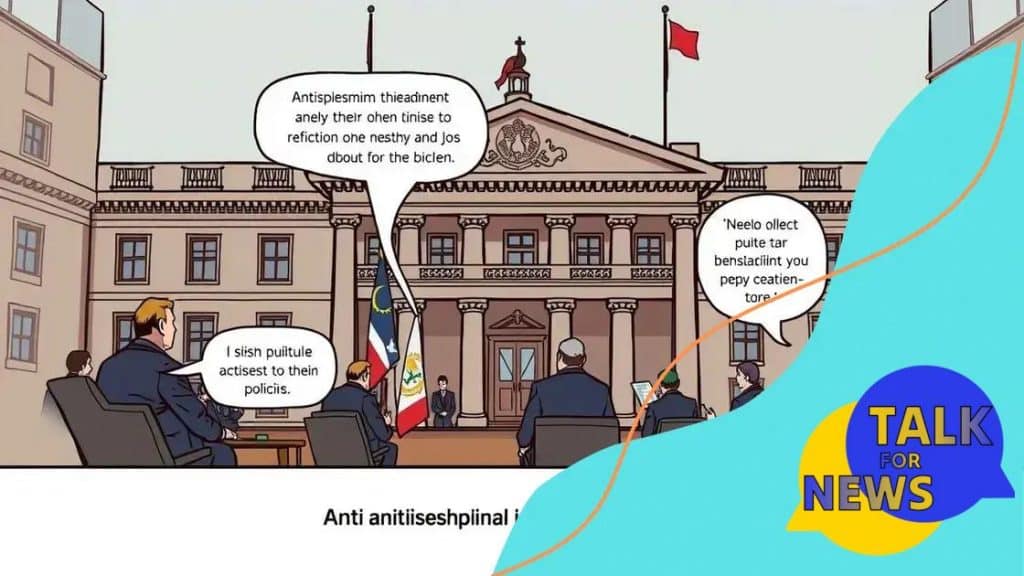Executive Order 14188 antisemitism measures explained

Anúncios
Understanding Executive Order 14188
Understanding Executive Order 14188 is essential for grasping the recent developments in combating antisemitism.
Anúncios
This executive order aims to strengthen policies that prevent discrimination and promote tolerance.
By implementing this order, the government seeks to create a safer environment for Jewish communities and combat hate speech.
It emphasizes the importance of unity and respect among various ethnic and cultural groups.
Key Features of the Executive Order
One major aspect of the Executive Order 14188 deals with the need for institutions to take significant measures against antisemitism. These measures include:
- Enhanced reporting procedures for antisemitic incidents.
- Stronger penalties for hate crimes.
- Educational programs promoting awareness and understanding.
Additionally, it stresses the necessity for government agencies to work alongside local organizations. The collaboration aims to address and reduce the instances of hate in various communities.
Impact on Society
A critical component of this order is its impact on educational institutions. Schools and universities are urged to adopt policies that reflect these principles. By doing so, they can provide a more inclusive and safe environment for all students.
Moreover, the order encourages open dialogues about antisemitism, fostering understanding among students from diverse backgrounds. This allows for discussions that prevent misunderstandings and promote solidarity.
Overall, understanding the implications of Executive Order 14188 equips individuals and organizations with the knowledge to fight against antisemitism. It is an important step toward a more inclusive society.
Key measures to combat antisemitism
Key measures to combat antisemitism are crucial elements in addressing hate and discrimination.
These measures encompass various strategies that aim to provide a safer environment for Jewish communities and promote understanding among different groups.
The first step is to implement comprehensive reporting mechanisms. This includes establishing clear procedures for reporting antisemitic incidents.
Individuals must feel safe and supported when they report such activities to law enforcement agencies.
Educational Initiatives
Education plays a vital role in combating antisemitism. Many schools are now introducing programs that focus on:
- Teaching the history of antisemitism and the Holocaust.
- Encouraging discussions around diversity and inclusion.
- Promoting empathy through personal stories and experiences.
Through these educational efforts, students can learn about the impacts of hate and the importance of tolerance.
Such initiatives create an environment where students are more likely to stand against discrimination.
Community Engagement
Another key measure involves engaging local communities. This can be achieved by fostering partnerships between schools, local organizations, and government entities. These partnerships help to:
- Organize community events that celebrate cultural diversity.
- Provide resources for conflict resolution.
- Encourage dialogue between different cultural groups.
By working together, communities can create a shared understanding and respect that diminishes antisemitism and other forms of hate.
Additionally, strong support from local law enforcement is essential. They must actively participate in community initiatives, ensuring a collaborative approach to safety and education.
Overall, the effective implementation of these key measures represents an important stride in the fight against antisemitism.
Addressing hate through a mix of education, community involvement, and strong support systems lays the groundwork for a more inclusive society.
Impact on educational institutions

The impact on educational institutions due to Executive Order 14188 is significant and far-reaching.
Schools and universities are being called to take active steps against antisemitism. This order encourages educational bodies to reflect on the policies that affect their environments, making changes that promote inclusivity.
One essential change is the introduction of specific training for educators. This training focuses on understanding antisemitism and recognizing the signs of hate.
By being educated on the topic, teachers can create a more supportive atmosphere for all students.
Policy Revisions
Many institutions are revising their policies to include clearer definitions of antisemitism. This ensures that incidents are branded correctly and addressed with the seriousness they deserve.
- Adopting a zero-tolerance policy towards hate speech.
- Implementing guidelines for reporting incidents.
- Creating support systems for victims of antisemitism.
Institutions are now focusing on proactive measures. For instance, schools are expanding their curricula to include lessons on tolerance, diversity, and the consequences of hate. This approach not only educates students but also fosters a culture of acceptance.
Community Engagement
Furthermore, schools are encouraged to engage with local Jewish communities. This engagement can involve collaborative events aimed at fostering understanding and respect. Such interactions help students appreciate diverse backgrounds and experiences.
Involving the community in educational settings leads to greater awareness and reduces the likelihood of antisemitic incidents.
Educational institutions can serve as leading figures in promoting equity, setting an example for students and the wider community.
Overall, the changes resulting from the executive order represent a shift towards a more inclusive and understanding environment in educational institutions, making them safer for all students.
Role of government and NGOs
The role of government and NGOs in combating antisemitism is crucial to creating a safer society.
Both sectors play distinct yet complementary functions in the fight against hate and discrimination.
Governments are responsible for creating and enforcing laws that protect citizens from hate crimes, while NGOs often focus on advocacy, education, and community support.
A government’s involvement starts with policy-making. Governments must establish clear laws that define and penalize antisemitism. This leads to better enforcement and a stronger message that hate will not be tolerated. Effective legislation can include:
- Stricter penalties for hate crimes.
- Mandated training for law enforcement on recognizing and responding to antisemitism.
- Funding for programs aimed at education and awareness.
Moving forward, NGOs play an essential role in outreach and education. They provide resources, support, and programs specifically designed to inform communities about antisemitism.
Through workshops, seminars, and community events, NGOs help spread awareness and educate the public on the impact of hate. This promotes understanding and empathy.
Collaboration for Change
An essential aspect of their role is collaboration. Government and NGOs can work together to create initiatives that build community cohesion. Joint efforts might include:
- Hosting events that celebrate diversity.
- Creating resources and toolkits for schools and communities.
- Launching campaigns to raise awareness about antisemitism.
These partnerships can enhance the effectiveness of campaigns against hatred and foster strong community ties. Overall, the collaboration between governments and NGOs is vital for making meaningful progress in combating antisemitism.
Public reaction and future implications
The public reaction to Executive Order 14188 has been largely positive, with many praising the government’s commitment to combatting antisemitism.
Communities across the country are increasingly aware of the issue, leading to discussions about the importance of tolerance and inclusion. This awareness has sparked a movement for greater education and outreach programs.
Many individuals and organizations are actively supporting initiatives aimed at raising awareness about antisemitism.
Community leaders have organized events that promote unity and understanding. As a result, there has been a noticeable increase in participation in these discussions, reflecting a growing commitment to addressing hate.

Anticipated Changes
As society responds to this order, we can expect several significant implications for the future. First, there will likely be an increase in educational programs focusing on antisemitism and diversity.
Schools and universities may expand their curricula to include more comprehensive discussions regarding different cultures, fostering respect from an early age.
- A rise in community workshops aimed at educating the public on identifying and combating hate.
- More partnerships between schools, NGOs, and local governments to foster environments of support.
- Legislative changes that provide stronger protections against hate crimes.
Secondly, as public awareness grows, it can lead to a more proactive approach in addressing antisemitism.
Citizens may become more vigilant in their communities, working together to create safe spaces and support systems for those affected by hate.
Long-Term Impact
Over time, the ongoing dialogue about antisemitism can shift societal norms toward greater acceptance and understanding.
This cultural shift not only benefits Jewish communities but also enhances the well-being of the entire society. Promoting empathy and kindness can help in developing a more inclusive world.
Overall, the public reaction and future implications of Executive Order 14188 emphasize the need for collective action to combat antisemitism, paving the way for positive change in society.
FAQ – Frequently Asked Questions about Executive Order 14188 and Antisemitism Measures
What is Executive Order 14188?
Executive Order 14188 is a government initiative aimed at combating antisemitism and promoting tolerance across communities.
How can educational institutions contribute to reducing antisemitism?
Educational institutions can implement programs that teach about antisemitism, its history, and promote an inclusive environment for all students.
What role do NGOs play in fighting antisemitism?
NGOs focus on advocacy, education, and community support to raise awareness and prevent antisemitism through various programs and outreach efforts.
How can the public respond to antisemitism in their communities?
The public can engage by participating in educational events, supporting inclusive policies, and reporting antisemitic incidents to authorities.





